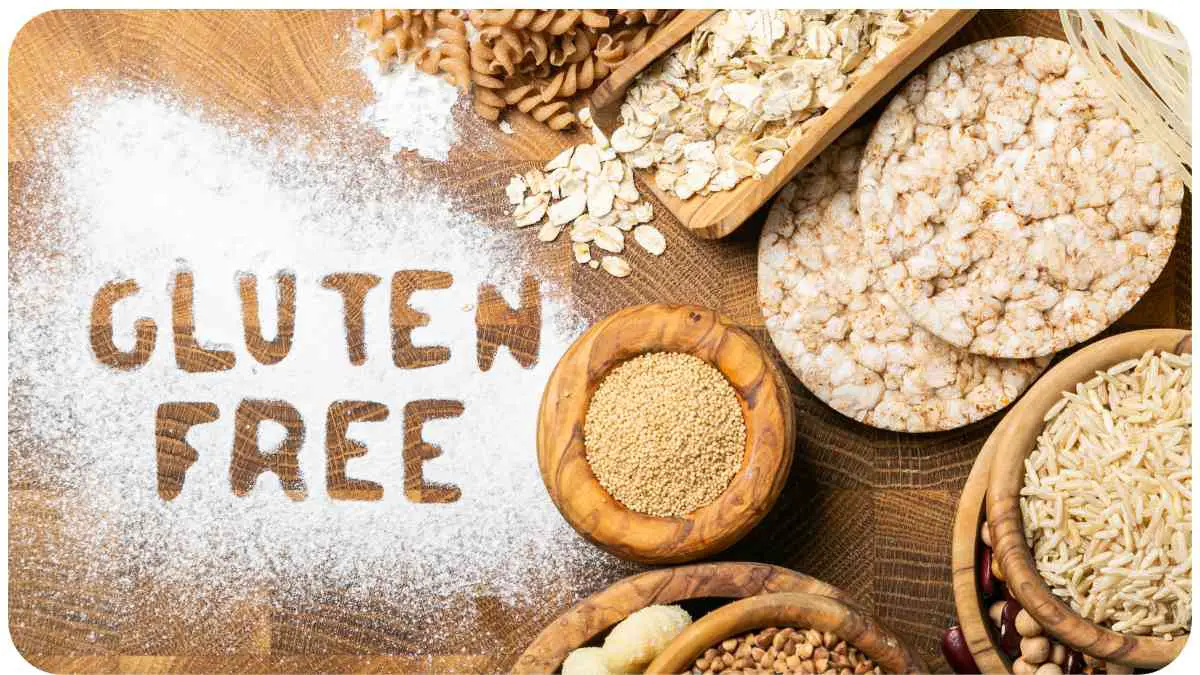Welcome to the comprehensive guide on gluten-free diets. In this article, we will explore the pros, cons, and tips for following a gluten-free diet. Whether you have celiac disease, gluten sensitivity, or are simply considering going gluten-free, this article will provide you with valuable insights and personal expertise to make informed choices.
| Takeaways from Gluten-Free Diet |
| Pros and cons of a gluten-free diet |
| Importance of consulting healthcare professionals |
| Reading food labels and understanding gluten sources |
| Need for a well-balanced gluten-free diet |
| Exploring gluten-free alternatives and superfoods |
2. What is Gluten?

Before we delve into the advantages and disadvantages of a gluten-free diet, let’s first understand what gluten is. Gluten is a mixture of proteins found in wheat, barley, rye, and other related grains. It provides elasticity to dough, helping it rise and giving baked goods their desired texture. However, for individuals with certain conditions, gluten can be problematic.
3. Pros and Cons of a Gluten-Free Diet
3.1 Pros of a Gluten-Free Diet
A gluten-free diet offers numerous benefits for those who require it. Many individuals with celiac disease experience significant relief from symptoms by eliminating gluten from their diets. Additionally, some studies suggest that a gluten-free diet could provide benefits such as improved digestive health, increased energy levels, and enhanced overall well-being.
A Guide to Meal Planning for Kids with Autism aims to provide practical tips and strategies for parents to create nutritious and appetizing meals for their children with autism. The article emphasizes the importance of understanding their unique dietary needs and preferences.
3.2 Cons of a Gluten-Free Diet
While a gluten-free diet can be highly beneficial for individuals with specific conditions, it also has some potential downsides. One of the main challenges is the limited food choices available and the need for careful meal planning to ensure a well-balanced diet. Gluten-free products are often more expensive and may have lower nutritional value compared to their gluten-containing counterparts.
3.3 Is a Gluten-Free Diet for Everyone?
It’s important to note that a gluten-free diet is not necessary for everyone. If you don’t have celiac disease, gluten sensitivity, or any other medically diagnosed condition requiring a gluten-free diet, there is generally no need to eliminate gluten from your meals. Gluten-containing foods, such as whole grains, can provide important nutrients like fiber and B vitamins.
4. Tips for Following a Gluten-Free Diet
Now that we have discussed the pros and cons, let’s dive into some practical tips for following a gluten-free diet. Whether you’re new to the gluten-free lifestyle or a seasoned veteran, these tips will help you navigate your way through the dietary changes.
4.1 Reading Food Labels
One of the first steps to successfully adopting a gluten-free diet is to become adept at reading food labels. Look for gluten-containing ingredients such as wheat, barley, and rye. Familiarize yourself with less obvious sources of gluten, such as malt vinegar or certain sauces, to avoid any accidental consumption.
4.2 Stocking Gluten-Free Pantry Staples
When following a gluten-free diet, it’s essential to have a well-stocked pantry. Keep your kitchen filled with gluten-free staples like rice, quinoa, gluten-free flours, and gluten-free oats. Having these ingredients readily available will make it easier to prepare delicious and nutritious gluten-free meals at home.
4.3 Dining Out and Traveling on a Gluten-Free Diet
Navigating restaurants and traveling while following a gluten-free diet can seem challenging, but it’s definitely manageable with a little preparation. When dining out, consider researching gluten-free options or contacting the restaurant ahead of time to inquire about their accommodations for gluten-free meals. It’s also helpful to communicate your dietary needs clearly to the waitstaff. When traveling, pack gluten-free snacks and meals to ensure you have safe options while on the go.
Discover the numerous health benefits and delicious recipes involving leafy greens in the article Why You Should Be Eating More Leafy Greens. Incorporating these nutritious vegetables into your diet can contribute to improved overall well-being and immunity.
4.4 Maintaining a Well-Balanced Gluten-Free Diet
To maintain a healthy gluten-free diet, focus on incorporating a variety of nutrient-dense foods. Opt for naturally gluten-free foods like fruits, vegetables, lean proteins, nuts, and seeds. These whole foods not only provide essential nutrients but also add diversity to your meals. Consider consulting with a registered dietitian to help you create a well-balanced gluten-free eating plan.
Now that we’ve covered some essential tips for following a gluten-free diet, let’s move on to exploring some gluten-free recipes and meal ideas.
5. Gluten-Free Recipes
5.1 Breakfast Ideas
Starting your day with a nutritious and gluten-free breakfast is crucial for maintaining energy and focus. Here are a few gluten-free breakfast options to inspire your mornings:
| Recipe | Ingredients |
| Gluten-Free Pancakes | Almond flour, eggs, milk, honey, salt |
| Quinoa Breakfast Bowl | Quinoa, berries, nuts, honey |
5.2 Lunch and Dinner Options
Moving on to lunch and dinner, here are a couple of gluten-free recipes that are both delicious and satisfying:
| Recipe | Ingredients |
| Grilled Salmon | Salmon fillet, olive oil, lemon, herbs |
| Gluten-Free Pizza | Gluten-free pizza crust, sauce, toppings |
| Recipe | Ingredients |
| Chicken Stir-Fry | Chicken breast, mixed vegetables, gluten-free sauce |
| Quinoa Salad | Cooked quinoa, mixed vegetables, vinaigrette |
Feel free to experiment with different ingredients and flavors to personalize these recipes according to your taste preferences.
Bakers, rejoice! Explore The Ultimate List of Kitchen Gadgets for Bakers and discover must-have tools that will enhance your baking endeavors. From precision measuring to precise temperature control, these gadgets will take your baking to new heights
6. Gluten-Free Lifestyle and Beyond

6.1 Dispelling Myths about Gluten-Free Diets
There are many myths surrounding gluten-free diets. It’s important to separate fact from fiction to make informed decisions. One common misconception is that gluten-free automatically means healthier. While it may be true for some individuals with specific conditions, it’s not a universal truth. A gluten-free diet can still include processed foods that are high in sugar and unhealthy fats. It’s essential to consume whole, nutrient-dense foods to maintain a balanced gluten-free lifestyle.
6.2 Exploring Gluten-Free Alternatives and Superfoods
Being on a gluten-free diet opens up opportunities to explore a wide range of alternative grains and superfoods. Quinoa, buckwheat, and amaranth are excellent gluten-free alternatives rich in protein, fiber, and other essential nutrients. Incorporating superfoods like chia seeds, flaxseeds, and kale can further boost the nutritional value of your meals. Experiment with these ingredients to make your gluten-free meals exciting and nutritious.
| Superfood | Health Benefits |
| Chia Seeds | High in fiber, omega-3 fatty acids, antioxidants |
| Flaxseeds | Rich in omega-3 fatty acids, lignans, fiber |
| Kale | Packed with vitamins A, C, and K, and minerals |
6.3 The Importance of Seeking Professional Advice
While this article provides valuable insights and tips, it’s crucial to consult with a healthcare professional, registered dietitian, or nutritionist if you have specific dietary concerns or medical conditions. They can assess your individual needs and offer personalized advice to ensure you are following a safe and effective gluten-free diet.
Upgrade your culinary skills with the help of the comprehensive list of essential kitchen tools mentioned in Upgrade Your Cooking Game with These Top Kitchen Tools. These gadgets will make your cooking experience more efficient, seamless, and enjoyable.
7. Conclusion
In conclusion, a gluten-free diet can be a beneficial choice for individuals with celiac disease, gluten sensitivity, or specific medical conditions. It offers relief from symptoms, improved digestive health, and overall well-being for those who require it. However, it’s essential to understand the pros and cons, read food labels diligently, and maintain a well-balanced gluten-free diet.
By following the tips, recipes, and advice shared in this article, you can confidently embrace a gluten-free lifestyle while still enjoying delicious and nutritious meals. Remember, consulting a healthcare professional is key for personalized guidance on your gluten-free journey.
Further Reading
Here are some additional resources for further reading on the topic of gluten-free diets:
Verywell Fit – Gluten-Free Diet: Pros and Cons: This article provides an in-depth analysis of the pros and cons of a gluten-free diet, discussing its potential benefits and drawbacks for different individuals.
Forbes – The Truth About Gluten-Free Diets: Forbes explores the truth behind gluten-free diets, discussing their impact on different health conditions and providing insights into the scientific perspective.
Seasonal Cravings – Pros and Cons of a Gluten-Free Diet: Seasonal Cravings offers a comprehensive review of the pros and cons of a gluten-free diet, discussing the considerations individuals should keep in mind when adopting this dietary approach.
Learn valuable techniques and tips for consistently achieving perfectly cooked meals in To Achieve Perfectly Cooked Meals Every Time. From temperature control to resting periods, this article covers the finer details of culinary mastery
FAQs
What is celiac disease?
Celiac disease is an autoimmune disorder in which the ingestion of gluten leads to damage in the small intestine. It is estimated to affect approximately 1% of the population. Symptoms can range from digestive issues to malabsorption of nutrients.
Is a gluten-free diet suitable for weight loss?
While a gluten-free diet can lead to weight loss due to the elimination of certain high-calorie gluten-containing foods, it is not recommended solely for weight loss purposes. It is crucial to focus on a balanced diet and overall healthy lifestyle for sustainable weight management.
Can a gluten-free diet improve digestive health?
For individuals with celiac disease or gluten sensitivity, a gluten-free diet can significantly improve digestive health by reducing symptoms such as bloating, abdominal pain, and diarrhea. However, for individuals without these conditions, a gluten-free diet may not have the same impact on digestive health.
Are there any risks associated with a gluten-free diet?
There are potential risks associated with a gluten-free diet, primarily related to nutrient deficiencies. Since gluten-free products often lack certain essential nutrients like iron, B vitamins, and fiber, it is important to ensure proper nutritional balance and consider supplementation if necessary.
Can I self-diagnose gluten sensitivity?
It is not recommended to self-diagnose gluten sensitivity. If you suspect that you may have gluten sensitivity or any other condition related to gluten, it is best to consult with a healthcare professional for proper evaluation and diagnosis.

Hi, I’m Hellen James! I’m a professional chef who has been cooking for over 12 years. In my career, I’ve worked at some of the world’s most prestigious hotels and restaurants. My expertise lies in creating recipes that are simple but delicious, and I love to experiment with new ingredients and techniques. I started this blog because I want to share my passion for cooking with everyone who loves food as much as I do.


